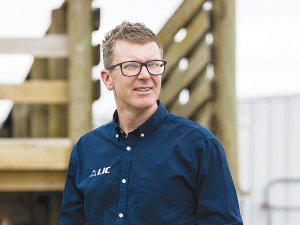LIC lifts half-year revenue on strong demand for dairy genetics
Herd improvement company LIC has posted a 5.2% lift in half-year revenue, thanks to increasing demand for genetics.
 LIC chair Corrigan Sowman says farmers continue to recognise the value of investing in productive herds.
LIC chair Corrigan Sowman says farmers continue to recognise the value of investing in productive herds.
Increased farmer spending on genetics and animal health has boosted LIC’s half-year profit.
The farmer co-operative posted a net profit after tax of $39 million for six months ending November 30, up 35% over the previous year.
Total revenue rose 8% to $185m. The co-op has also signalled a full-year underlying earnings range of $18m to $22m.
It says the improved results can be attributed to improved economic conditions and farmers choosing to invest in LIC’s products and services like fresh sexed semen, GeneMark Genomics and animal health testing.
LIC board chair Corrigan Sowman expressed pride in the co-operative’s progress, saying, “I am incredibly pleased to see farmers continue to recognise the value of investing in productive herds and resilient farms.
“As a generational co-operative and world leader in pasture-based dairy herd improvement, we will continue to work alongside farmers to improve the profitability and efficiency of the national dairy herd. As your board chair, I look forward to working with the LIC board and management to continue delivering value for our farmer shareholders.”
Reflecting on the first half of the financial year, LIC chief executive David Chin noted that the cooperative’s investments are delivering tangible outcomes for farmers.
“We are making significant progress toward breeding cows with lower methane emissions,” Chin says.
“Our research (funded by the New Zealand Agricultural Greenhouse Gas Research Centre) has confirmed that genetic variation influences how much methane heifers produce.
“We are now one step closer to breeding low-emission cows.
“The next step is the building of a state-ofthe- art research barn to enable large-scale monitoring of lactating cows. We are proud to contribute to emissions reductions and look forward to offering farmers low methane-emitting genetics soon.”
In addition to methane research, LIC continues to lead in herd improvement through its genomic evaluation tools.
“The launch of our new Genomic product in July 2024 has seen significant uptake from farmers,” Chin says. “We’ve now surpassed a major milestone, genotyping over 1 million animals. This milestone reflects the growing trust farmers place in these tools to help accelerate the genetic gain in their herds.”
LIC’s commitment to operational excellence has also delivered outstanding results for the fresh sexed semen product.
“The performance of our fresh sexed semen product has exceeded expectations, with 18-24 day non-return rates now within 1% of conventional fresh semen,” says Chin.
“This allows farmers to achieve even better results by breeding from their highest-performing cows.”
Farmers’ focus on herd health is also evident, as demonstrated by a significant increase in Johnes Disease testing. Testing rates have doubled in the first six months of the season compared to 2023, reflecting a growing focus on disease management.
Strategy Review
LIC is evaluating its strategy to ensure alignment with farmers’ needs and future opportunities.
“To continue delivering for our farmer shareholders, we are revisiting our strategy to ensure it is fit for purpose,” says chief executive David Chin.
“This includes planning for future investments that benefit our farmers. We’ll share updates on this work in the first half of 2025.”
Former Fonterra executive Alex Turnbull has been appointed CEO to lead all five Yili Oceania Business Division companies in New Zealand.
Fonterra executive René Dedoncker is leaving the co-operative later this year to lead Australian agribusiness Elders.
Alliance Group and the Southland Stags rugby team have joined forces in a partnership that will see the the meat co-operative's farmgate brand feature on players' team kits and replica jerseys.
Fonterra's plan to expand its organic programme to the South Island is being well received by farmers, the co-op says.
Voting has started for the renewal of DairyNZ's milksolids levy.
The most successful catchment groups in NZ are those that have 'a source to sea' approach.
OPINION: A dairy version of fantasy football has been launched.
OPINION: In recent weeks beaches in Auckland, Wellington and Christchurch have been unsafe to swim in because of recent heavy…